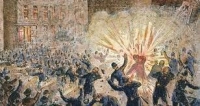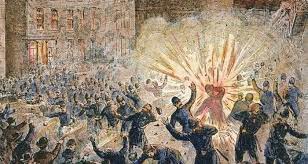May Day Haymarket Affair in 1886 in Chicago Remembered
Saturday 01 May, 2021 Written by History Today
MAY DAY - May Day in the US originated to honor the Haymarket Affair in 1886 in Chicago. The working class then combined a struggle for the 8-hour workday with a struggle for change beyond capitalism. Too often since, those two kinds of struggles have not been combined. Distrust, suspicion, and government repression kept them apart.
At Haymarket Square in Chicago, Illinois, a bomb is thrown at a squad of policemen attempting to break up a labor rally. The police responded with wild gunfire, killing several people in the crowd and injuring dozens more.
The demonstration, which drew some 1,500 Chicago workers, was organized by German-born labor radicals in protest of the killing of a striker by the Chicago police the day before. Midway into the rally, which had thinned out because of rain, a force of nearly 200 policemen arrived to disperse the workers. As the police advanced toward the 300 remaining protesters, an individual who was never positively identified threw a bomb at them. After the explosion and subsequent police gunfire, more than a dozen people lay dead or dying, and close to 100 were injured.
The set off a national wave of xenophobia, as hundreds of foreign-born radicals and labor leaders were rounded up in Chicago and elsewhere. A grand jury eventually indicted 31 suspected labor radicals in connection with the bombing, and eight men were convicted in a sensational and controversial trial. Judge Joseph E. Gary imposed the death sentence on seven of the men, and the eighth was sentenced to 15 years in prison. On November 11, 1887, Samuel Fielden, Adolph Fischer, August Spies and Albert Parson were executed.
Of the three others sentenced to death, one died by suicide on the eve of his execution and the other two had their death sentences commuted to life imprisonment by Illinois Governor Richard J. Oglesby. Governor Oglesby was reacting to widespread public questioning of their guilt, which later led his successor, Governor John P. Altgeld, to pardon fully the three activists still living in 1893.

ABC Comment, have your say below:

Leave a comment
Make sure you enter all the required information, indicated by an asterisk (*). HTML code is not allowed.
Join
FREE
Here










